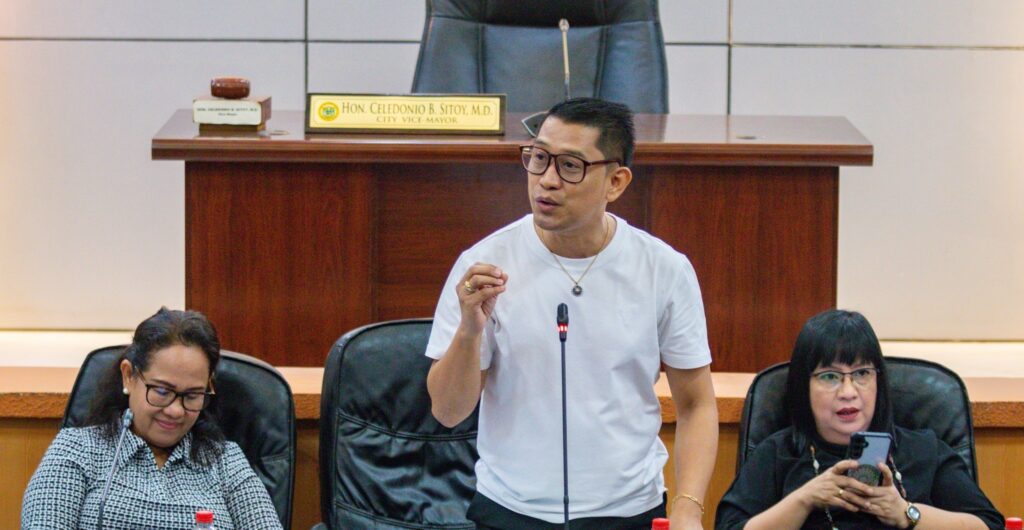
Garry Lao (center), in-charge of the Lapu-Lapu City Tourism Office, called for a coordination meeting with tourism stakeholders to discuss their concerns. | Photo from Lapu-Lapu City PIO
LAPU-LAPU CITY, Cebu – The Lapu-Lapu City government, through the City Tourism Office (CTO), held a coordination meeting with boat, tour, and dive operators, and tour guides on Wednesday, August 14, to listen to their concerns and find means to address these.
At the same time, Garry Lao, the CTO officer-in-charge, urged tourism stakeholders to have themselves accredited.
Lao said that their accreditation by the CTO will already be include in the requirements for the issuance of a permit to operate next year.
READ: Lapu uses mobile wallet to collect traffic fines, environmental fees
In addition, Lao said they plan to come up with a list of accredited service providers which they will recommend to the hotels and visiting tourists.
Other issues discussed during the gathering, held at the session hall of the Lapu-Lapu City Hall, include the collection of environmental fees, the need to ensure environmental conservation and sustainability, and updates from the Department of Tourism in Central Visayas (DOT-7).
READ: Pumpboat operators struggle as P100 environment fee reduces tourists in Lapu-Lapu
Environmental fee
During the meeting, dive instructors raised a concern on the collection of the P100 environmental fee from tourists who will go island hopping and engage in other sports and recreational activities.
A question was also raised is dive instructors will also be asked to pay environmental fee since they conduct their trainings within the premises of their respective resorts?
READ: Tourists transfer to Cordova as Lapu-Lapu City imposes environmental fee
Earlier, boat operators urged the city government to lower the fee because it was already affecting their operations as tourists would now prefer to go island hopping in Cordova town where the environmental fee is much lower.
Councilor Annabeth Cuizon, authored of the ordinance that allows the collection of the P100 environment fee promised to, promised to review her legislation and consider the concerns raised by dive instructors.
READ: Environmental fees: Lapu-Lapu collected P80,000 on May 1
However, the collection of the said fee will continue until such time that her ordinance is amended.
Under Cuizon’s ordinance, tourists who will engage in snorkeling and other water activities will be asked to pay the P100 environmental fee.
Exemptions are granted on Oponganons.
QR code
Acting City Treasurer Claire Cabalda said that they will soon set up QR Codes in tourism shops to facilitate the easy and immediate payment of the environmental fee.
She expressed hope that the scheme will also address concerns on tourists who refuse to pay the said fee.
“I hope we no longer receive reports of those refusing to pay the environmental fee,” Cabalda said.
During the coordination meeting on Wednesday, Cabalda read the names of those with pending obligations as she reminded them of sanctions provided under the current city ordinance.
A written warning is given to the violator for the first offense while a written warning will be issued and a fine of P3,500 will have to be paid for the second offense.
Violators will be asked to pay a fine of P5, 000 and risk the revocation of their business permit the next time that they violate the ordinance.
‘Hupo-hupo’
Meanwhile, Judalyn Taghoy of the Cebu Association of Tour Guides Inc. raised a concern on unlicensed tour guides referred to as ‘hupo-hupo” who are illegally operating in the city.
Taghoy said that tour guides must be accredited by the Department of Tourism (DOT) and must obtain a permit from the Lapu-Lapu City government before they should be allowed to operate.
Accreditation requirements for boat operators include an updated business permit and valid government-issued IDs for boat operators.
In addition, their crew members are required to submit either a valid government-issued IDs or barangay certification.
Tour guides, on the other hand, are asked to present their DOT accreditation, a mayor’s special permit, and valid government-issued IDs.

